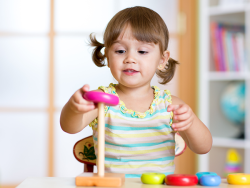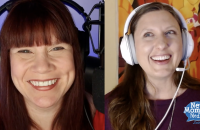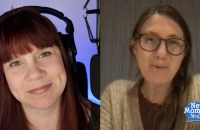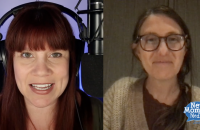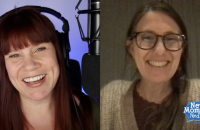Sunny Gault
We all know children learn in different ways and Montessori is a technique that more and more parents are checking out. So we're going to talk about this today. I'm Sunny with v. And I'm joined here with Simone Davies. She's a best selling author, and a Montessori educator. Hi, Simone. Thanks so much for being with us.
Simone Davies
Hi, Sunny. Thanks so much for having me.
Sunny Gault
Okay, so let's start at the beginning. What is Montessori? How do you typically describe this to parents that aren't familiar with it?
Simone Davies
Yeah, I usually first described Montessori in its educational setting, like for a preschool class and how you would walk in and instead of seeing a teacher standing at the front of the classroom, you see children all working on their own activities, some of them working in pairs, some of them side by side. And some of them might just be standing and observing other children at work. Because actually, you know, you learn a lot when by observing other children, and you haven't mixed age of children as well. So from three to six-year-olds, or six to nine, nine to 12-year-olds, so you have older children who are learning to help younger children and consolidate their own learning While they're doing that. And then younger children who are picking things up so naturally from older children, you know, you know yourself, you've got four children, how quickly the young ones learn from the older children. And so it's really a hands-on method, there are beautiful materials laid out in the classroom. So instead of the teacher saying, This is what you should do today, the child knows where they're up to. And they can go and select an activity that they know, from the shelves, it could be from maths or geography, there's botany, zoology language. And so it's such a rich environment, there are also taking care of the classroom and each other. So it's also building a lot of these soft skills, which are overlooked in our traditional education system. So then, monster for babies, and for toddlers is applying these same principles at home, how can I treat my child individually, rather than a milestone chart that tells me my child's meant to be doing this by this time? How do we slow down and give them time to explore with their hands? Because this is for your learners, they don't need a tablet or an iPhone, they need real things in their hands. And a conversation with us is also an important material as well. Right? Absolutely.
Sunny Gault
So for parents that are just checking this out, how do you know if this is a good fit for your child? I mean, are there some kids that this may not work well, for? Like I'm even thinking of, you know, children with any kind of learning disabilities or anything like that? Like, is there anything that parents need to be aware of as they're considering this for their family?
Simone Davies
Yeah, so we like to say is one three education that Montessori is for every child because it does treat every child uniquely like if a child comes to my class, I want them to feel like I'm observing them, I'm waiting to respond to them in a way that they want to be responded to. So one child is going to bounce up to you to say hello, and another is going to be a bit more hesitant and I'm going to adjust to every child. So that's what we do as a parent is that we keep adjusting to every child that's in front of us. If you have more than one child, you'll adapt and parent in that unique way. If you have a child that learns kinesthetically, that means with their hands, it works for them, as well, as a child who will learn visually or orally, we all learn in different ways. And I love that the Montessori method, so holistic in that way, I love it, if they give you have a child that really watches, and that's how they learn. And there's another child that kind of just repeats, repeats, and repeats until they've mastered it, and it works for both of them as well. And people also say, well, maybe Montessori is only my child so busy. So I don't think they'd work in a Montessori classroom, they always look so peaceful and quiet. And I actually say, I think they're actually perfect for a Montessori classroom because I mentioned them in a traditional classroom where they have to sit still all the time, you know, at least they can go into their activity, they can walk around, have a look what else is going on, maybe go outside, and then come back in. And I think that really fit in and everyone's unique. I know a lot of people who've used Montessori, who have, you know, cerebral palsy where their muscle development may not be so advanced, but then you adjust, you're like, Okay, well, they may not be able to do the gross motor things that another toe will do. But cognitively, their development is still on, we want to be working at their level, wherever they're at. So I'll support and guide wherever the child is. So I said, we say it's for every child, and then you can adjust your parenting to meet their needs.
Sunny Gault
Okay, and you kind of touched on this earlier, but I just kind of wanted to emphasize this, even if you don't start as a baby, because some of you moms and dads out there that are watching this, you may already have one or more children that are older than a baby, and maybe you're just hearing about this, and you know, you think it might be a good fit, and you want to try it. This goes kind of goes without saying, Simone, but you know, can children enter this at any stage? Or is there some sort of cut-off point? Or how does that work?
Simone Davies
Well, I say it's never too early to start. But I also say it's never too late to start either. So if you've only discovered it, and your child's going into elementary school, then you adjust you only know what you know, you don't have to feel bad that you didn't weren't doing these things earlier that you miss certain things, but you can start to observe your child and follow their needs and but also have your own limits. So it's not about everything becoming about the child. It's like, these are my needs. This is my child's needs, and how can we all have our needs met and so I think it's a really beautiful approach to raising children in a family that's part of the child wants to contribute and wants to be part of it. And so you can start at any age. That's great.
Sunny Gault
Well, this is someone's book. It's called the Montessori baby. You can pick this up on Amazon or your local bookstore. And if you want to head on over to our website, it's newmommymedia.com. We've got more great videos like this, as well as podcasts, blog posts, anything you really need. And that is where real moms talk about real life. So we'll see you over there.

